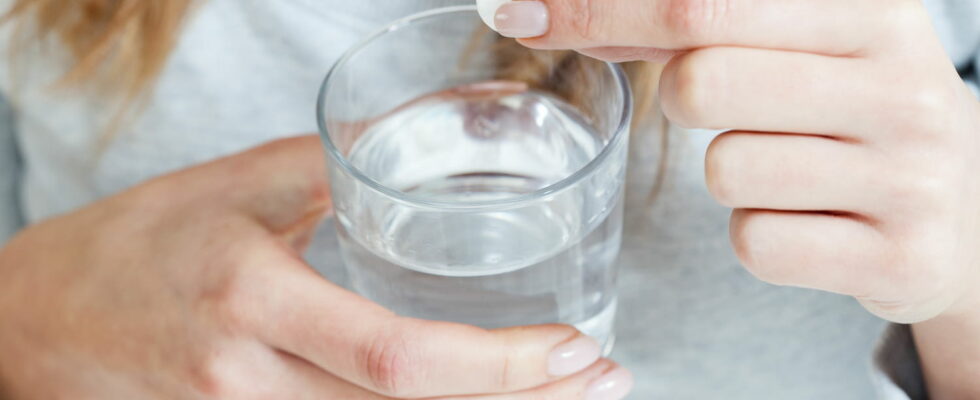It’s one of the remedies to have during the holidays when you’ve eaten too much, drunk too much or have problems digesting.
During the holidays, some people won’t be able to do without it. Our grandmothers’ remedy, betaine citrate is THE medicine to have at home or in your bag when you have difficulty digesting! “It is particularly indicated when you eat a little richer than usual”indicates pharmacist Issam Bouha. Dosage, contraindications, if you drink alcohol, if you are pregnant… Here is how to take (without risk) betaine citrate.
What is betaine citrate?
Betaine citrate is a medicine whose active substance is extracted from beets. It is indicated in case of digestive problems, bloating or intestinal discomfort. This medicine comes in the form of‘an effervescent tablet dissolve in half a glass of water, before or after a meal. If this self-medication specialty is over the counter in pharmacies, However, it is not trivialand you must scrupulously respect its dosage and instructions.
How long should you take it?
“You must scrupulously respect what is indicated on the instructions, namely one tablet one to three times a day for a short period of time (2-3 days)as well as the pharmacist’s instructions. And once you feel better, it is advisable to stop the treatment. However, if symptoms persist, you should consult a doctor.“, specifies Issam Bouha. Generally, betaine citrate has a positive effect on digestive discomfort from the 1st or 2nd day of taking. “To my knowledge, I have never heard of any cases of overdose. But it is certain that it should not be abused. In any case, the duration of treatment is limited to 7 days. If symptoms persist for more than 7 days, consult a doctor.
What are the dangers and side effects?
THE betaine citrate is reserved for adults and those over 15 years of age. Like any medication, allergic reactions may occur after taking betaine citrate: pimples, itching or redness of the skin (allergic hives), swelling of the neck or face (angioedema). In case of adverse effects after taking the medication, consult a doctor or pharmacist immediately. Likewise, if you are taking or have recently taken any other medicine, including medicine obtained without a prescription, talk to your doctor or pharmacist to avoid any risk. bad drug interaction. There are no laxative effects reported with the betaine citrate.
Against digestion problems?
“This medication is indicated in the treatment of digestive disorders such as digestive slowness or bloatingspecifies Issam Bouha, pharmacist. You can take it if you experience digestive discomfort or if you have a swollen stomach”. According to the Medicines Agencybetaine is involved in the synthesis of phospholipids (lipids formed from a glycerol linked to two fatty acids) which have an action on gastric motility. In other words, the betaine promotes movements of the digestive system : these contractions serve to mix the food contained in the digestive tract, to break them up and break them into smaller pieces in order to digest them better.
Against liver attacks?
“Betaine citrate is particularly indicated during the holidays or when we eat a little richer than usualindicates the pharmacist, After a meal that is too fatty, the liver can be overloaded with triglycerides or cholesterol.” This is called “a liver attack” in the popular French language. Betaine citrate promotes liver stimulation: it stimulates the release of bile – a liquid secreted by the liver which promotes digestion – to metabolize excess fats and therefore facilitate digestion. During treatment, it is advisable to eat light meals, avoid sparkling water and avoid alcohol, spicy foods and tobacco.
After consuming alcohol (hangover)?
After a drunken evening, it is possible to take a betaine citrate tablet just before bed. The active substance of this medication will accelerate the breakdown of toxins – therefore alcohol – by the liver and prevent it from being transformed by liver enzymes into acetaldehydea substance responsible for nausea and the feeling of “hangover”. If the next day you do not feel better, you can take a second tablet just before a light, low-fat lunch. Remember that it is also important to hydrate well in order toeliminate acetaldehyde more quickly and that alcohol abuse is dangerous for your health.
What are the contraindications?
Betaine citrate is contraindicated:
- Under 15 years old. “We avoid administering products to children for which there is little or no information on the risks of overdose or side effects.“, specifies our interlocutor.
- To pregnant women during the first trimester of pregnancy.
- For people allergic or hypersensitive to the active substance or to one of the components contained in betaine citrate.
- For people with fructose intolerance or in cases of glucose or galactose malabsorption.
Can you take betaine citrate when you are pregnant?
Betaine citrate is contraindicated for pregnant women during the first trimester of pregnancy. There are currently no sufficiently relevant data to assess a possible malformative or fetotoxic effect of betaine citrate when administered during pregnancy. If in doubt, it is best not to take betaine citrate throughout pregnancy and the breastfeeding period.
“Turning towards medications that we all have at home, such as betaine citrate, should not be systematic”
What precautions should you take before taking betaine citrate?
A swollen stomach, bloating, loss of appetite and absence of stools for 3-4 days can reveal another problem (esophageal candidiasis, Crohn’s disease, irritable bowel, etc.) than a simple digestive disorder and require appropriate treatment. In this case, betaine citrate is absolutely not indicated. “This medicine should only be administered after a well-targeted questioning from the pharmacist (date of last bowel movement, description of symptoms, transit status, diet, medical history, etc.). Reaching for medications that we all have at home, such as betaine citrate, should in no case be systematic.“, concludes the pharmacist.
How much does betaine citrate cost?
A box of 20 betaine citrate tablets (two cases of 10 effervescent tablets) costs between 3.50 euros and 4.95 euros. This medication is not reimbursed by Health Insurance.
Thanks to Issam Bouha, pharmacist.
